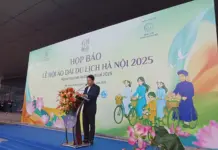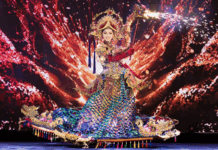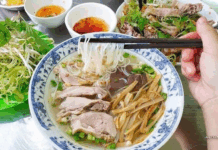The Gie Trieng weave fabric in their leisure time after farm work. The loom is simple.
They plant cotton in May, pick cotton in October, and do all the processes from dying yarns and weaving fabric to tailor clothes. The patterns on their clothes, ponchos, and blankets are unique.
Nguyen Thi Huyen, a postgraduate in ethnicity at the Hanoi National University, said, “The Gie Trieng wear strapless maxi dresses. They prefer red decorations on indigo dresses. It’s a typical Gie Trieng dress which is rarely seen in other ethnic groups.”
Gie Trieng women wear their hair long and tie it up behind their heads. They wear many kinds of gold and silver jewelry. In the past, women of high-profile families wore ivory jewelry.
Children under 4 years old wear anklets with little silver bells on them. Gie Trieng men wear loincloths and go shirtless. In cold weather they wear vests and ponchos. They often wear headscarves and earrings made of precious wood or ivory.
Huyen said, “A Gie Trieng loincloth is decorated with patterns along its length and at both ends. For important events, they wear indigo ponchos.”
They embroider different motifs on their clothes, which are colorful and eye-catching.
Photographer Nguyen Thuy Chieu said, “I’ve been to many places and visited many ethnic groups. I see that Gie Trieng clothes have flowery patterns. Women’s clothes are especially impressive.”
Cultural exchange and economic development have affected the lifestyle of the Gie Trieng, including their clothing habits. They wear the same clothes as the Kinh people in their daily life and their traditional costumes for important events.




